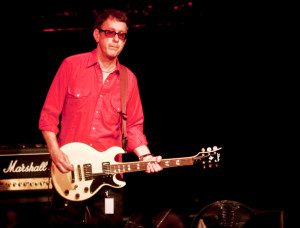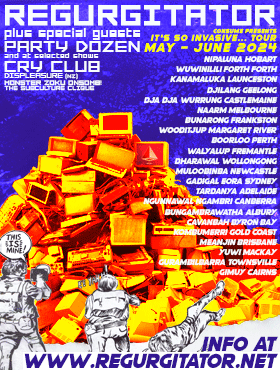September 2011. by Greg Phillips. pic by Mary Boukouvalas
 On one side of the Atlantic in the late 70s, UK band The Sex Pistols were leading a rock revolution by questioning, teasing and poking fun at convention. On the other side of the planet, American punk rockers The Dead Kennedys were creating equal parts energy and controversy with their provocative lyrics, song titles and album artwork. A quick look at The Dead Kennedys’ resume shows that they spent much time in the US legal system defending their artistic freedom and then later turning on themselves fighting over songwriting credits and royalties from the record company they formed together. A 2003 court decision found that charismatic lead singer Jello Biafra had stolen from the other members of the band, East Bay Ray, DH Peligro and Klaus Flouride. These days, Jello tours the world (denying any DKs wrong-doing) performing spoken word tours (and will be here in October as part of the Melbourne Festival). The remaining members toured Australia earlier this year with Wynona Riders’ Skip Greer out front, in what was probably the last ever incarnation of the band. Lead guitarist and co founder of the DKs, East Bay Ray has a new band, The Killer Smiles. Ray kindly took the time to answer Australian Musician’s Greg Phillips’ questions, not only about his sound and new music project, but also delved deep into the past and his time with The Dead Kennedys.
On one side of the Atlantic in the late 70s, UK band The Sex Pistols were leading a rock revolution by questioning, teasing and poking fun at convention. On the other side of the planet, American punk rockers The Dead Kennedys were creating equal parts energy and controversy with their provocative lyrics, song titles and album artwork. A quick look at The Dead Kennedys’ resume shows that they spent much time in the US legal system defending their artistic freedom and then later turning on themselves fighting over songwriting credits and royalties from the record company they formed together. A 2003 court decision found that charismatic lead singer Jello Biafra had stolen from the other members of the band, East Bay Ray, DH Peligro and Klaus Flouride. These days, Jello tours the world (denying any DKs wrong-doing) performing spoken word tours (and will be here in October as part of the Melbourne Festival). The remaining members toured Australia earlier this year with Wynona Riders’ Skip Greer out front, in what was probably the last ever incarnation of the band. Lead guitarist and co founder of the DKs, East Bay Ray has a new band, The Killer Smiles. Ray kindly took the time to answer Australian Musician’s Greg Phillips’ questions, not only about his sound and new music project, but also delved deep into the past and his time with The Dead Kennedys.
The Dead Kennedys influenced a lot of bands and affected a lot of fans deeply, but what do you see as the band’s legacy? What are you most
proud of?
I’ve always been a big fan of music deep down. I can’t imagine life without it, so to find myself in a place where I’m an influence for other people is truly fulfilling for me.
You came out of California … what did you think of the New York punk scene initially?
I loved the great variety and songwriting of the early New York scene, The Ramones, Television, Blondie, The Talking Heads, etc. It opened up rock music and made it new again.
What’s your take on where and how punk rock began?
Didn’t it actually sort of start as a publicity gimmick by Malcolm MacLaren for The Sex Pistols? But it sure hit a nerve and then took on a life of its own, people brought their own beliefs and feelings to it and punk rock went way beyond its start. There’s a kind of continuum to punk music, with Sid Vicious on one end, nihilism and image … he didn’t even play on the records … to Johnny Rotten on the other, with his intelligence and awareness. Dead Kennedys were closer to the Johnny Rotten end of things.
The band has had a long connection with the legal system. What are the lessons learned from your legal experiences over the years?
That was one of the most awful things I had to go through, to find out that we … Klaus, DH and I, were lied to and cheated by someone we trusted and looked up to. He stole songwriting credits from us and skimmed royalties from his bandmates, his partners. When we did find out what he did, rather than acknowledge his mistakes, he used his media position to spread lies about us.
When you think back to some of those early tours, any particular road stories which still make you laugh?
The DKs were to do a show at a high school once, but the students putting on the dance couldn’t get approval for us, so we had them go back and get approval of this band called The Cream Sickles, which was us! It was a great show!
Who are some of the artists you admire, not just musically but for sticking to their principles?
I heard a story, don’t know if its true, that the lead singer of INXS refused to be on the cover of Rolling Stone Magazine without all of his bandmates. After all, he had spent many years playing with them before Rolling Stone came around, they were more important to him.
Do you think music is still a force for change?
I feel that music can affect an individual and that’s where things start, but music doesn’t change things, you do. Change rarely comes down from the top; it starts with how you treat your friends, family, co-workers and people you meet. If you don’t do it there, it will never happen anywhere.
A lot of legendary music came out of scenes … cities creating new sounds. Do you see that happening anywhere in US now?
I like The Sour Notes out of Austin, Texas.
In the early days, DK’s music was seen as controversial. Today for some, it’s nostalgic. Does time dilute the message?
Given the direction the world is going in, I think the band’s message is even more relevant today than it was back then. Our main massage is basically to think for yourself. Get the facts before you accept an opinion. But lately I have never seen so many uninformed people have such misguided opinions about things they really haven’t spent the time to find out about, it’s scary.
If Jello Biafra walked into the same room as you now, what kind of conversation would take place?
What do you say to someone that has exploited and used you but does not seem to feel any regret about it?
A lot of the players you are into Lightning Hopkins, Scotty Moore … the older guys … didn’t use effects (didn’t have effects then!). It
was all in their fingers. Is that an aspect of their playing that you admire?
It was my dad who took me to see Lightning Hopkins when I was a kid. I would say I’m much more in to one soulful note than a billion fast licks.
You were also into Syd Barret. What was it about Syd’s sound that captured your imagination?
The originality and the echo sound, it inspired me. Later I was able to get my hands on an Echolpex tape delay unit, that was a happy day.
Do you remember what your first fx pedal was?
An old Gibson Fuzztone and then the Echoplex!
How important is volume as a tool in the music you play?
Very important. I’m always using the guitar’s volume control for different sections of songs, to vary the dynamics of the music. Another key for me is to have good timing and phrasing. I listen to a lot of vocalist like Merle Haggard, Billie Holiday, even the Chairman of the Board, that’s where it’s at!
Many musicians playing punk don’t seem to get the kudos from the critics, but you’ve found yourself in guitar polls. How do you feel about that?
It’s an honour to be recognized and not stereotyped. It’s good that its slowly coming around, and my originality and uniqueness are getting recognized.
The Sex Pistols’ original bass player, Glen Matlock told me he used to get upset by people saying the Pistols couldn’t play. He took a lot of pride in trying to put on the best show possible (not so sure it was same with Sid). How did you guys approach shows in the 80s … What was the most important factor … the energy? The message? To shock … or just rock?
All of us in the DKs can play. It’s about the energy and rockin’ out and then the message. If you just shock, that only last a short time but when you make great music, that can have an impact for a lot, lot longer. Cutting edge things that have a lasting impact are the radical changes to form that take place, not the content, which will be shocking for only a little while until people get used to it.
When the band begun, you were angry (or maybe not) young men, with a lot of energy to release. As you get older as a musician, does exploring sound become more important to you? Do you appreciate musicianship more?
I think I appreciate music more than musicianship, it’s not how many notes you play but how much they feel.
Assuming you drive, what have you been listening to lately in the car?
Afro Beat from Nigeria!
What’s happening with your new band Killer Smiles?
Producer Paul Leary (Butthole Surfers, Sublime) and I are working on the mastering of The Killer Smiles CD and it’s due to be released September 13. It’s going to be called East Bay Ray and The Killer Smiles. The label releasing the CD is MVD Entertainment and they have ties to Australia so I hope to be back soon playing some new songs! And of course some of the great old DK ones!


